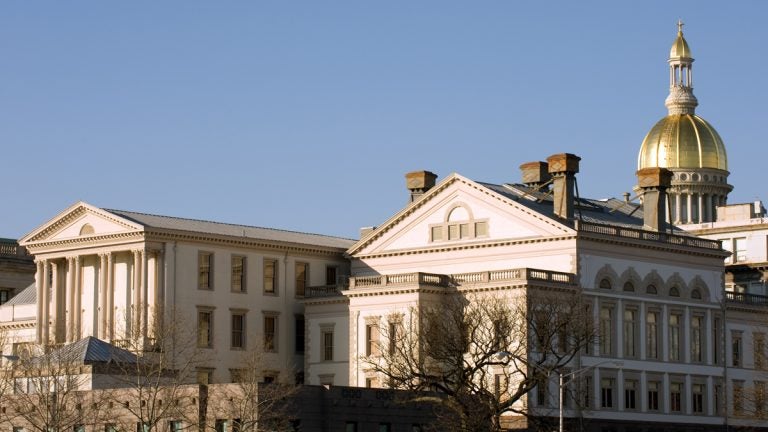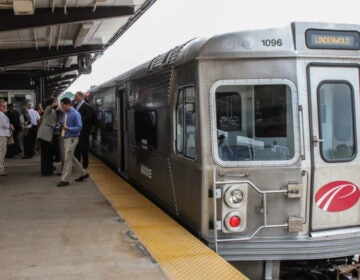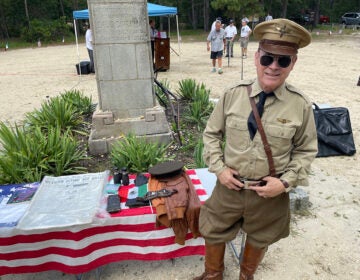Gov Christie, Legislature on collision course for constitutional showdown

Trenton state Capitol building. (Shutterstock)
Gov. Chris Christie and the Democratic Legislature appeared headed toward a constitutional showdown over the Bridgegate scandal yesterday, as Christie weighed his legal options and Republicans questioned the partisanship of an Assembly committee that issued 20 subpoenas to targets that included some of the highest-ranking members of Christie’s inner circle.
The unexpectedly large list of subpoenas issued yesterday by Assemblyman John Wisniewski (D-Middlesex), chair of the Assembly Select Committee on Investigations, made it clear that he was aiming beyond fired Deputy Chief of Staff Bridget Anne Kelly and dismissed campaign guru Bill Stepien to target all of the top Christie aides named in previously subpoenaed documents released last week — a list that stops just short of the governor himself.
The short-term disruption in the embattled governor’s office is likely to be significant, with current Chief of Staff Regina Egea, former Chief of Staff and Attorney-General-in-waiting Kevin O’Dowd, Press Secretary Michael Drewniak, and Communications Director Maria Comella all reportedly receiving subpoenas answerable in two weeks with public testimony under oath likely to follow in mid-February.
Christie’s best options yesterday seemed to be either to invoke some level of executive privilege to protect the inner workings of his governor’s office from public scrutiny or to argue that the public investigations by the legislative committees would interfere with a proper probe by the U.S. Attorney’s Office. Such an investigation by the U.S. Attorney could take Bridgegate out of the public eye for months, and its closed-door inquiry would avert the damaging spectacle of a series of Christie aides following the lead of the Port Authority’s David Wildstein in taking the Fifth Amendment.
For Christie, still the frontrunner for the Republican presidential nomination in an NBC/Marist University poll released Wednesday, the stakes are high. The governor, who dropped from just three points behind Democratic frontrunner Hillary Clinton to 13 points down in the wake of Bridgegate, has a dinner with major Republican donors in Florida Sunday hosted by Home Depot founder Ken Langone, who urged him to run for president in 2012. Christie, who is chairman of the Republican Governors Association, will be raising money for Florida Gov. Rick Scott, but a planned public event was cancelled after Bridgegate became national news last week.
Plotting a Legal StrategyTo develop its legal strategy, the Christie administration yesterday announced it was hiring the law firm of Randy Mastro, a New York lawyer who served as deputy mayor under Rudy Giuliani, one of Christie’s most vocal defenders in the Bridgegate scandal, to serve as outside counsel and effectively as the gatekeeper for the production of the thousands of documents that will be sought by the half-dozen investigations now underway.
Christie, who said last week he did not interview Kelly and Stepien because he did not want to be accused of interfering with ongoing investigations, announced yesterday that he is conducting his own “internal review to uncover the facts surrounding the lane closures in Fort Lee,” and that his administration would be “fully cooperating with the U.S. Attorney inquiry and other appropriate inquiries and requests for information.”
Christie’s press statement pointedly left out any specific commitment to cooperate with the special investigative committees that were formed by the Assembly and Senate yesterday. The statement used the same “appropriate inquiries” disclaimer that Christie used in his State of the State speech Tuesday, which aroused Democratic suspicions that the governor might be planning to stonewall the legislative committees.
No Comment on Cooperation”Is this an ‘appropriate’ investigation?” Assembly Minority Leader Jon Bramnick (R-Union) asked. “We’ll have to wait to see,” he said, adding that he “couldn’t comment” on whether the governor would cooperate with the Wisniewski committee or the Senate panel chaired by Senate Majority Leader Loretta Weinberg (D-Bergen).
“My concern is that if you’re going to act like a prosecutor, you run the risk of exposing innocent people to public scrutiny,” Bramnick said of Wisniewski. “You’re talking about taking private communications that were made in the expectation of privacy and subjecting them to public scrutiny. It’s not obstructionism, it’s a legitimate institutional concern for people in government that their privacy should be respected.”
Republicans in both the Senate and Assembly yesterday rallied around Christie, questioning the partisan motives of Democratic leaders. Assemblywoman Amy Handlin (R-Monmouth) demanded assurance that the Wisniewski committee “will not be a Coliseum that exists solely for the purpose of throwing as many people as possible to the lions.”
Wisniewski dismissed the partisan criticism and said he would expect the governor to act in good faith unless he proves otherwise. “We have no reason to believe the governor won’t cooperate. We are certainly an ‘appropriate’ investigation,” he insisted. Wisniewski brought in his own heavy hitter as special counsel to the committee, hiring Reid Schar, the former assistant U.S. Attorney who successfully prosecuted Illinois Gov. Rod Blagojevich.
Wisniewski’s committee met behind closed doors in executive session yesterday before agreeing to issue subpoenas to 17 individuals and three organizations. While Handlin and the other three Republicans on the committee tried unsuccessfully to prevent Wisniewski from being given the unilateral power to issue subpoenas, Wisniewski said all four Republicans approved the subpoenas being issued.
While Wisniewski declined to name the individuals and groups receiving the subpoenas because he did not want them to find out about it on TV or from other publications, his acknowledgement that subpoenas were going to those who received emails or texts about the George Washington Bridge lane closures or their aftermath left little mystery about most of the names on the subpoena list.
Wisniewski had already said he planned to start with Kelly, the deputy chief of staff who evidently ran a political operation within the governor’s office that included the incriminating August 13 email to Wildstein that it was “Time for traffic problems in Fort Lee,” and Stepien, Kelly’s predecessor and political mentor who had served as campaign manager for Christie’s winning 2009 and 2013 races. Christie last week fired Kelly and severed all ties with Stepien, including his nomination as state Republican chairman and his consulting contract with the Republican Governors Association, which Christie heads.Other top targets named in the emails and other documents subpoenaed last month from Wildstein and Port Authority Deputy Executive Director Bill Baroni, both of whom resigned in December, included:
Drewniak, the governor’s press secretary and close aide since Christie became U.S. Attorney in 2001, who approved the Port Authority’s September 12 press release blaming the four days of lane closures on an apparently phantom traffic study, planned how to stonewall subsequent media inquiries, and met with his friend Wildstein right before his resignation.
Egea, the director of the Governor’s Authorities Unit whom Baroni sent Port Authority Executive Director Patrick Foye’s September 13 memo reversing the lane closures, which Foye said not only delayed emergency vehicles, but also “violates Federal Law and the laws of both States.” It is unclear whether or how Egea, whom Christie last month appointed as his Chief of Staff, traditionally the second-most-powerful post in the governor’s office, followed up on the memo.
Port Authority Chairman David Samson, who worked with Baroni to attempt to squelch Foye’s public disclosure of the secret lane closures.
Charles McKenna, the governor’s former chief counsel who carefully watched Baroni’s testimony before Wisniewski’s Assembly Transportation Committee in late November and reported that Baroni did “great.”
Comella, Christie’s communications director and Drewniak’s boss, who worked with Stepien on Giuliani’s failed presidential campaign in 2008 before latching onto Christie.
The subpoenas presumably would have included O’Dowd, Kelly’s direct boss as chief of staff, whose nomination by Christie to become state Attorney General has been stalled in the wake of the Bridgegate scandal. Democrats will want to know what he knew about Kelly’s activities before allowing his nomination to go to the Senate Judiciary Committee.
Matt Mowers, the regional director for the Christie campaign whose responsibility included Bergen County and who was the campaign staffer who reportedly approached Fort Lee Mayor Mark Sokolich to ask for his endorsement before the bridge closings, also received a subpoena, according to a release issued by the New Hampshire Republican Party. Mowers was named executive director of the New Hampshire GOP following Christie’s reelection in what was widely seen as a move by Christie to put a trusted aide in a key position in an important 2016 presidential primary state.
The three organizations that received subpoenas are most likely the Governor’s Office, the Port Authority, which has previously been subpoenaed, and the Christie campaign, where both Stepien and Mowers worked at the time of the George Washington Bridge lane closures.
‘Zero Evidence’The wave of subpoenas last night overshadowed yesterday’s pronouncement in Washington by U.S. Sen. John D. Rockefeller IV (D-W.Va.) that his U.S. Senate Committee on Commerce, Science and Transportation had found “zero evidence” in documents supplied by the Port Authority to support the notion that the George Washington Bridge lanes were closed for a legitimate traffic study. “It is unconscionable that anyone would block commercial traffic and risk the safety of thousands on our interstate highway system in this way,” Rockefeller declared.
The issuance of the Assembly subpoenas also took away some of the luster from the announcement by Weinberg, the Senate majority leader whose Bergen County district includes Fort Lee, that Kelly, Egea, and Stepien would be the first three recipients of subpoenas to be issued by her Senate Select Committee on Investigations.
Republicans in both houses questioned the need and the extra financial cost of the Assembly and Senate appointing two separate investigative committees, a decision that Senate President Stephen Sweeney (D-Gloucester) blamed on the unwillingness of Assembly Democratic leaders to agree to form a single joint committee.
“Leave it to Democrats to foul up what should be an easy slam dunk by having to create two committees!” one Democrat fumed privately.
Wisniewski said yesterday that the Assembly Select Committee on Investigation is “on a much faster track than the newly formed Senate committee could ever be” because it is a continuation of the Assembly Transportation Committee investigation whose subpoena powers led to the cache of documents that included the email tracing the lane closures to Kelly.
Indeed, Wisniewski was ready to present his new committee with 20 fully prepared subpoenas yesterday afternoon based specifically on the thousands of pages of documents produced by Wildstein, Baroni, and other Port Authority officials in response to the Assembly Transportation Committee’s subpoenas.
Sweeney appointed the seven members of Weinberg’s committee yesterday, but the panel did not meet, and whether it would issue separate subpoenas to Kelly, Stepien, and Egea now that the Wisniewski committee has already done so is unclear. Sen. Kevin O’Toole (R-Essex), a close Christie ally whom the governor unsuccessfully tried to have replace Senate Minority Leader Thomas Kean (R-Union), will be a fierce advocate for Christie’s interests on the panel.
Wisniewski and Weinberg both held out the possibility that the Assembly and Senate committees would find ways to work together in the future and avoid duplicating efforts, with Wisniewski suggesting that the committees might meet jointly to hear from subpoenaed witnesses.While Republicans suggested during the Assembly floor debate that the Wisniewski committee should be given a 90-day deadline to complete its investigation, Wisniewski said setting a deadline of any sort would be foolish.
“We know a number of people that have been discussed have retained counsel. We could have people fight us on these subpoenas and it could take longer,” Wisniewski noted, adding that “it’s entirely possible we could get to the end of our two-year subpoena power and still not have all the answers.”
Republicans asked tough questions during both the Senate and Assembly floor debates yesterday, with Sen. Joseph Pennacchio (R-Morris) even asking why the Senate Special Committee on Investigations did not expand its aegis to include other past scandals, such as former Gov. Jim McGreevey’s appointment of his former lover, Golan Cipel, as head of Homeland Security.
But in the end, Republicans voted unanimously with the Democrats for the resolutions creating the investigative panels, which passed the Senate 33-0 and the Assembly 75-0, a tacit recognition that they did not want to be on record voting against the creation of an investigative committee in case there proves to be more to the scandal than is currently known.
Similarly, while the GOP members of Wisniewski’s committee, led by Handlin and Assemblywoman Holly Schepisi (R-Bergen), argued vigorously against the resolution giving Wisniewski the sole authority to issue subpoenas and control over the release of subpoenaed documents within the committee, the four Republicans later voted behind closed doors to approve all 20 of the subpoenas issued.
“Nobody wants to be on the wrong side of this thing in case there’s something there,” one Statehouse observer commented. “Everybody remembers what happens to those who stayed on the wrong side for too long in Watergate.”
_________________________________________________
NJ Spotlight, an independent online news service on issues critical to New Jersey, makes its in-depth reporting available to NewsWorks.
WHYY is your source for fact-based, in-depth journalism and information. As a nonprofit organization, we rely on financial support from readers like you. Please give today.




